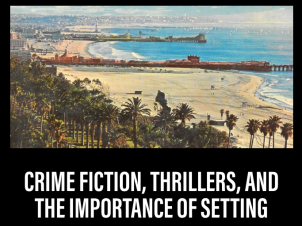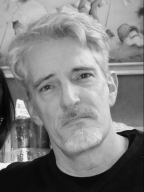 Recently (May 2, 2019), CrimeReads did a fine piece on The Importance of Setting, but its focus was on whether it made sense to choose a real place or to invent one.
Recently (May 2, 2019), CrimeReads did a fine piece on The Importance of Setting, but its focus was on whether it made sense to choose a real place or to invent one.
It’s an interesting read (and of course it added to my TBR pile!), but I’m fascinated with stories that use their settings almost as characters in their own right. Why did the story happen in one place and not another? Could the same story be told in a different locale? Why is this place different from any other?
Some of the most recent novels I’ve read–Buzz Killer by Tom Straw; Below the Fold by R. G. Belksy, Hipster Death Rattle by Richie Narvaez; Record Scratch by J.J. Hensley and August Snow by Stephen Mack Jones–all use the landscape of their chosen city very well. For Tom Straw and R. G. Belsky, it’s New York City; for Narvaez it’s Brooklyn (Williamsburg); for JJ Hensley, it’s Pittsburgh; and for Stephen Mack Jones, Detroit.
 I’m drawn to their subtly (and not-so subtly) expressed exasperation with how cities are changing. Since people started gathering in them, they’ve been a place of excitement, diversity and exchange, teeming with stories, with filth, and above all, a mixing of people. The writers listed above struggle with where we’re heading, and their protagonists and stories reflect that uneasiness.
I’m drawn to their subtly (and not-so subtly) expressed exasperation with how cities are changing. Since people started gathering in them, they’ve been a place of excitement, diversity and exchange, teeming with stories, with filth, and above all, a mixing of people. The writers listed above struggle with where we’re heading, and their protagonists and stories reflect that uneasiness.
Change has always been a constant, but this time feels different, they seem to say. In Buzz Killer, Macie Wild struggles with the notion that New York has become “a tale of three cities,” with little or no connection to one another; Belsky’s Clare Carlson struggles to synchronize a former New York’s giddy sense of possibility with what we see now. JJ Hensley’s Pittsburgh and Stephen Mack Jones’s Detroit are wistfully rendered, detailing and juxtaposing what was…with what is. (My only quibble with Hensley is that when casting about for really violent, dangerous thugs, his Yinzers import a group of–of course!–Philadelphians, as clearly among the worst. C’mon! Cleveland’s closer. They don’t have head-breakers?)
I liked that Hipster Death Rattle focused on Williamsburg, and the fraught changes happening there. It put me in mind of where I live. When people ask where I live, I say South Philly, because I don’t want there to be any doubt about what I mean. It’s distinct from the suburbs (obviously) and from Center City, the Northeast or, say Fishtown. It’s changing, too, but it’s still a mix of people (mostly) getting loudly along. Stoop culture still prevails and a dense web of family and extended family live throughout the neighborhood, just around the corner, up the block; and that family life is still largely enacted in public.
This isn’t where I come from, but it’s where I’ve chosen to be. So far, I haven’t written anything that’s set mainly here in Philly, though parts of both Faithless Elector and Dark Network take place on Catharine Street. But, like the authors and their work I’ve discussed above, I feel that there’s something coming.
Invent a place or work with what you’ve got? There’s freedom in making it all your own, certainly. But there’s more source material in a real place.
NOTE: I’ve begun posting reviews of the books I’ve read, and they can be accessed here. I also post them on Amazon, Goodreads and BookBub.
James McCrone is the author of the Imogen Trager NoirPolitik thrillers Faithless Elector and Dark Network. The third book, working title Emergency Powers, is coming soon.

Link to REVIEWS

TO JAMES McCRONE:
I thought I should drop a note having had the pleasure of meeting you Saturday afternoon at the Hilltop Book Store reading.
When I left at 4:40 with two of your books in hand and two by my old tennis group mate, Stanley, I wondered if I would ever get to read any of the four books I purchased. For the last several years most of my reading has been on Kindle and in the middle of the night when I can’t sleep.
After dinner, I read a few pages of Faithless Elector before falling asleep but can faithfully report that by eight o’clock Sunday night, I had finished the book.
Certainly not with the intrigue of your novel, but I have wondered about the possibilities of such scenarios since there was a faithless elector who did not vote for Stevenson and Kefauver in 1956. I do not remember my reaction to the one extra Electoral College vote that Strum Thurmond received in 1948 but the knowledge of it and those defections since have always played on my mind. We only have to look at those stories to know how plausible the events in your book are. The ten votes in 2016 and the later events leading up to and including the Capitol on January 6, 2021. Are a grave warning of what those two gentlemen in Wichita could possibly accomplish.
Stanley’s comparison of the 1948 and 2016 Democratic Conventions that were both held in Philadelphia and his book addresses the political differences of the times. Seeing the subject matter, I mentioned the divisiveness in the Democratic party that year and he reminded me that there had been a split and that Henry Wallace, Roosevelt’s former Vice-President had siphoned votes away from Harry Truman. I mentioned that Strum Thurman was a candidate only to be told how little difference the State’s Right walk-out of the convention had made.
Stanley was unaware that Thurman had received almost forty Electoral College votes from four states and that of one faithless elector from Tennessee who had become an elector before the breakaway. Henry Wallace received no votes. So much for one’s research and knowledge of the subject.
You certainly showed a different knowledge and your description of your thought process while writing gave an air of professionalism that made the afternoon worthwhile to me and even to the friends of Stanley who attended. Thank you.
I shall be sure to purchase and read all your available works and follow closely and new undertakings.
Since Saturday, I have also tried to read some of your background and particularly your time spent with 9th Street Italian Market.
Around the time of your taking the position with the market, Louis Esposito passed at age 95. His obituary mentioned that he originally wanted to be a lawyer but after receiving four campaign stars for his service in Army Intelligence during World War Two, he returned to Philadelphia and joined the family meat business.
In 2002, there was a disastrous arson fire at the Esposito Meat Market. I am a structural engineer who has designed the supports for buildings in twenty-five states but mostly in the Philadelphia, Wilmington and Jersey shore areas but my most rewarding experiences are the emergency calls I have gotten to help people with urgent problems.1 Within days of the fire, I was asked to come to the Esposito store. Only one little portion of the facility was cleared for occupation. In other areas the damage to the basic structure, the bones, was extensive. The family wanted to save what they could fix what was fixable, and reopen the entire store as quickly as possible. I was in my element, but having driven from New Hope, standing there in the freezing temperatures, debris and ice still covering the first floor, I realized that I would be of little help until I made a pit stop. When I inquired about a porta potty or other available facilities, a family member told me that they had rented a storefront up the street. The door would be open, the necessary room in the rear.
Family members, contractors, and an architect awaited my return and I briefly finished and headed back through the store noting that
what appeared to be salvageable from the offices was being shifted to this space. There on the floor, propped against a wall was a diploma from Villanova College. Being a Villanovan, I stooped to look and quickly noted the MCMXLIII on the diploma of Lous J. Esposito. From somewhere in the rear an older gentleman appeared and asked who I was and what I was doing. I told him my position and quickly putting two and two together asked if the diploma was his.
“Yes, but that’s not really the right date.” The story that followed along with the further conversation probably took the best part of a half hour.
Sometime during his junior year, the Army came to Villanova and other schools looking for Italian Americans who were absolutely fluent in Italian and particularly in the language spoken in southern Italy. Mr. Esposito was recruited for the newly formed OSS, the precursor to the CIA. Trained here and in Africa he was later transported by small boat or submarine across the Mediterranean and landed in Italy. Working alone or in pairs his job was to go throughout the area lining up food supplies for the American forces after the invasion. Money was smuggled in, deposits were made, and networks were established. Weeks after he would have graduated, British and American forces landed in Sicily, and on September 3, my sixth birthday, the toe of Italy was invaded.
I do not know or remember how long Mr. Esposito worked behind enemy lines but he stayed involved in similar work. It was not until the day before D-Day, June 5, 1944, that Mark Clark and the Allied forces marched into Rome.
Upon my return to the group at the store who had been impatiently awaiting my return, all criticism ceased when I told them I had met Mr. Esposito and he had been telling me his history. Respect ran deep in the family.
If you knew the story or couldn’t care less and have gotten this far, I’m sorry. It is a story I tell often to anyone with any connection to the Market. A brave man in his early twenties. A great man from America’s Greatest Generation.
Joseph W. Cooke
Memorial Day 2023
1 Faithless Elector page 31
LikeLike
Thanks very much for writing, Joseph (and reading!). I’m glad Faithless Elector grabbed you.
What a great story! And wonderful, lived (living) history. I didn’t know that about Mr. Esposito, and I’m very pleased to find out so much more. I remember his funeral while I was working at 9th Street. I didn’t attend, but the procession drove through the market, and businesses dimmed their work lights as the hearse passed out of respect. A lovely and fitting gesture of respect for one their own.
LikeLike